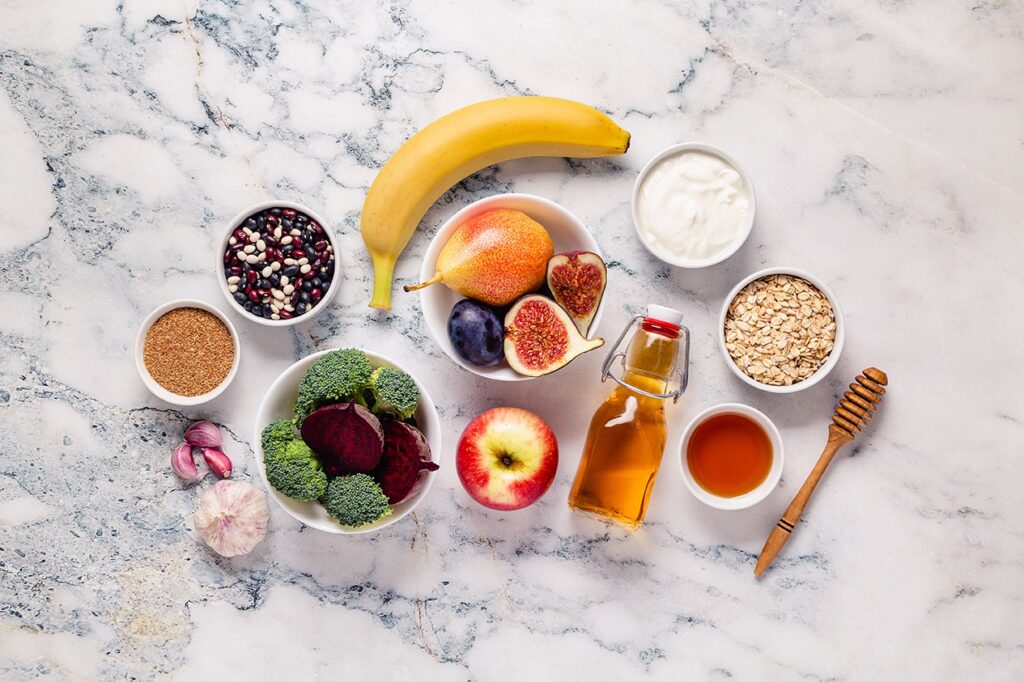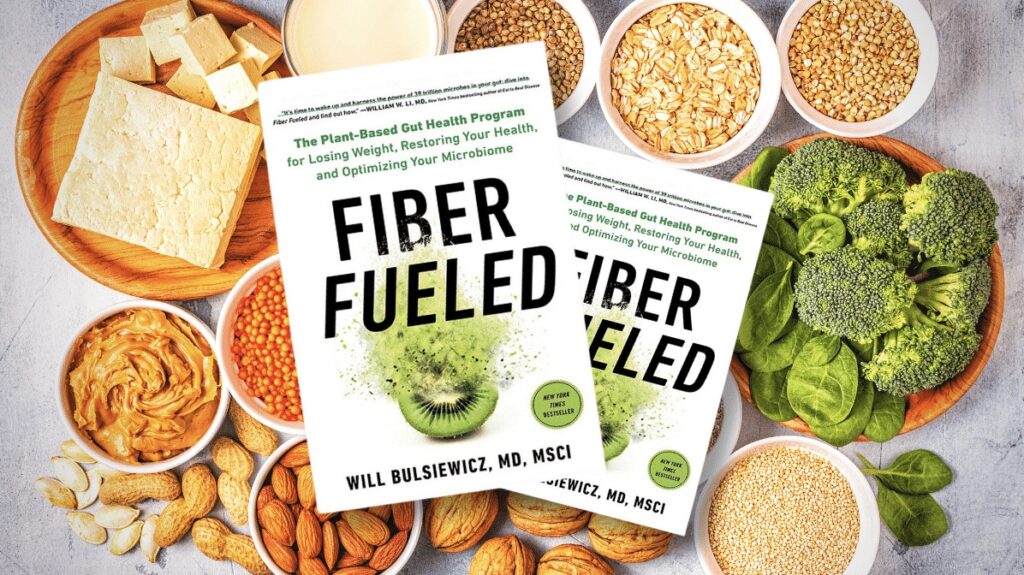Have you ever heard the phrase “trust your gut”? Well, there might be some truth to it. Our gut, or digestive system, plays a crucial role in our overall health and well-being. From our immune system to our mental health, the health of our gut can impact various aspects of our lives. In this guide, we’ll cover everything you need to know about gut health, from what it is and why it’s important, to tips and tricks for improving your gut health.

What is Gut Health?
Gut health refers to the overall well-being of the digestive system, which includes the stomach, small and large intestines, and the microbiome, which is the community of microorganisms that reside in the digestive tract. A healthy gut is one in which the digestive system is able to efficiently and effectively digest food, absorb nutrients, eliminate waste, and maintain a diverse and balanced microbiome.
The microbiome plays an important role in gut health, as it helps to break down and process food, produce certain nutrients, and support the immune system.
Poor gut health can lead to a range of digestive issues, including bloating, constipation, diarrhea, and food intolerances, as well as an increased risk of certain health conditions like obesity, diabetes, and autoimmune diseases.

Why Gut Health is Important
Gut health is hands down #1 important in the 1 to 10 numeric scale!
The gut, which includes the gastrointestinal tract and its associated organs, is responsible for digesting and absorbing nutrients from food and eliminating waste from the body- it’s home to trillions of microorganisms, including bacteria, fungi, and viruses, collectively known as the gut microbiome.
Gut health plays a critical role in our overall wellness and is often considered the foundation for optimal health. The gut is where our body processes and absorbs nutrients from the foods we eat, and it also houses a complex community of microorganisms that can influence everything from our mood to our immune system.

Research has shown that an unhealthy gut can contribute to a variety of health issues, including digestive problems, autoimmune diseases, allergies, mental health issues, and more. This is because a damaged gut lining can lead to increased inflammation, nutrient deficiencies, and imbalances in gut bacteria, which can then trigger a range of health problems throughout the body.
On the other hand, a healthy gut can support better digestion, nutrient absorption, and overall physical and mental health. It can also help to boost our immune system, reduce inflammation, and promote a healthy balance of gut bacteria.
That’s why it’s so important to prioritize gut health as part of our wellness routine. This includes eating a diverse, nutrient-rich diet, staying hydrated, managing stress levels, and taking steps to support healthy gut bacteria, such as through probiotics and prebiotics to help promote overall health and reduce the risk of a variety of health problems.

The Link Between Gut Health and Metabolic Syndrome
In recent years, there has been a growing interest in the connection between gut health and metabolic syndrome. Metabolic syndrome is a cluster of conditions that include high blood pressure, high blood sugar, excess body fat around the waist, and abnormal cholesterol or triglyceride levels. The condition is closely linked to the body’s ability to process insulin, which is a hormone that regulates blood sugar levels.
Research has shown that the gut microbiome, which is the collection of live microorganisms that inhabit the digestive tract, plays a significant role in metabolic health. Specifically, a more diverse microbiome has been associated with better metabolic health and a lower risk of developing metabolic syndrome.
The interplay between the intestinal microbiota and host metabolism is mediated by a myriad of factors, including a defective gut barrier [1], and changes in diet and activity patterns have been linked to decreased microbiome diversity, elevating inflammation and metabolic disease [2].

One of the ways to improve gut health and promote a more diverse microbiome is through diet.
The Mediterranean diet, which is rich in plant-based foods and healthy fats, has been shown to have numerous health benefits, including improving gut microbiomes and reducing the risk of metabolic syndrome.
In contrast, diets high in refined sugars and artificial sweeteners have been shown to disrupt the gut microbiome and promote weight gain, insulin resistance, and other metabolic problems.
In addition to diet, sleep physiology also plays a crucial role in gut health and metabolic function. Research has shown that a good night’s rest can help regulate the body’s metabolic processes, while poor sleep quality has been associated with weight gain and insulin resistance.

The Link Between Gut Health and Depression
Research has found that an imbalanced gut microbiome, or dysbiosis, is associated with mood disorders such as depression [3], and that people with IBS and functional bowel problems are more likely to develop depression and anxiety [4].
The gut and the brain are connected through the gut-brain axis, which is a bidirectional communication system that allows the brain to influence the gut and the gut to influence the brain. Research has shown that changes in the gut microbiota can affect mood and behavior, and can even contribute to the development of depression and other mental health issues.

The gut microbiota produces neurotransmitters such as serotonin, which is often referred to as the “feel-good” neurotransmitter because it is associated with feelings of happiness and well-being. In fact, the majority of the body’s serotonin is produced in the gut. When the gut microbiota is disrupted, serotonin production can be affected, which can lead to changes in mood and behavior.
In addition, inflammation in the gut has been linked to inflammation in the brain, which can contribute to the development of depression. This is because inflammatory cytokines can disrupt the functioning of neurotransmitters and other brain chemicals that are involved in mood regulation.

The Link Between Gut Health and Acne
Studies have found that 54% of people with acne also had a gut imbalance in their bacteria [5], suggesting a link between gut health and acne. Probiotics have been shown to help reduce acne by fighting off bad bacteria, balancing out the gut, and regulating cortisol levels [6].
One study found that people with acne had lower levels of beneficial bacteria in their gut and higher levels of harmful bacteria. Another study found that supplementing with probiotics, which can help rebalance the gut microbiome, reduced acne severity in participants.

In addition, some foods that can trigger acne, such as dairy products and high-glycemic-index foods, have also been found to have a negative impact on gut health. Consuming a diet rich in fiber, fruits, and vegetables, which are beneficial for the gut, may help reduce the risk of developing acne.
While more research is needed to fully understand the link between gut health and acne, it is clear that a healthy gut can play a role in maintaining clear skin.

The Link Between Gut health and Immune System Function
There is a strong link between gut health and immune system function [7]. The gut is often referred to as the “second brain” due to the significant role it plays in our overall health and wellbeing. The gut microbiome, which is the collection of microorganisms living in our digestive system, not only helps us break down and absorb the nutrients from the food we eat, but also plays a crucial role in regulating our immune system and producing neurotransmitters that affect our mood, cognition, and behavior.
When the gut microbiome is out of balance and dominated by harmful bacteria, it can lead to a range of health issues, including inflammation, autoimmune disorders, digestive problems, and mental health disorders like anxiety and depression. On the other hand, a diverse and healthy gut microbiome can support immune function, enhance nutrient absorption, and promote a sense of wellbeing.
That’s why taking care of our gut health through proper diet, stress management, and targeted treatments like probiotics and gut healing protocols is so important for overall health and wellness. By nourishing and supporting our gut, we can help boost our immunity, improve our mental clarity and mood, and feel our best every day.

Is Glutamine Good for a Healthy Gut?
Absolutely! Glutamine is a necessary part of proteins basically any food that contains protein will contain glutamine. It’s like a special helper that takes care of our gut. It helps the cells in our gut to grow and stay strong. When we eat, glutamine helps absorb the good stuff from our food and keeps the bad stuff out of our body.
The cells lining the gut use glutamine for energy and to maintain their structure and function. If we don’t have enough glutamine, our gut may not work properly and we may get sick. So, it’s important to focus on getting enough protein in our diet to increase glutamine consumption or take glutamine supplements to keep our gut healthy.

When the gut is under stress, such as during an infection, injury, or inflammation, the demand for glutamine increases. If the demand for glutamine is not met, the gut lining can become compromised, leading to increased intestinal permeability, or “leaky gut.” This can allow toxins, bacteria, and undigested food particles to pass through the gut lining and enter the bloodstream, which can lead to inflammation and other health problems like heart disease, chronic sleep disruption and upset stomach.
Glutamine can also help reduce inflammation in the gut, which can improve symptoms of conditions such as inflammatory bowel disease (IBD) and irritable bowel syndrome (IBS). Additionally, glutamine may help promote the growth of beneficial gut bacteria and keep our gut healthy.

8 Hacks for Gut Health Improvement
Diversify your diet
Healing your gut requires taking charge of your diet. One way to achieve this is gut microbiome diversity- by regularly diversifying your diet. As humans, we often develop preferences for certain foods, like avocado for example, and tend to eat them all the time.
However, to promote a healthy human gut, it’s important to constantly introduce new types of food each week. Eating a diverse range of plant foods, fruits, vegetables, whole grains, and healthy fats can help support the growth of beneficial gut bacteria. Try to incorporate a variety of colorful plant-based foods into your meals to give your gut a boost. Stay away from a high sugar diet and ultra processed foods.
By consuming a variety of foods, we can ensure that we are providing our gut bacteria with the nutrients they need to thrive.
Mindful eating
Taking the time to eat mindfully and slowly, chewing your food well, and savoring the flavors can help improve digestion and reduce gut inflammation. This practice can also help you to become more in tune with your body’s hunger and fullness signals.
Consume probiotic foods and prebiotic foods
Probiotics are beneficial bacteria that can help support a balanced gut, while prebiotics are indigestible fibers that feed the good bacteria in your gut. You can take probiotic supplements or get them from probiotic-rich foods like yogurt, kefir, sauerkraut, and kimchi. Prebiotics can be found in foods like bananas, asparagus, onions, garlic, and whole grains.

Get enough sleep
Lack of sleep can disrupt your gut microbiome and compromise your immune system, leading to gut inflammation and other digestive problems. Aim for 7-8 hours of sleep per night to help support a healthy gut.
Reduce stress
Chronic stress can disrupt the balance of bacteria in your gut, so finding ways to manage stress can be beneficial for your gut. Try meditation, yoga, deep breathing, or other relaxation techniques to help reduce stress.
Stay hydrated
Drinking enough water can help keep your digestive system moving and prevent constipation. Aim to drink at least 8 glasses of water per day and consider adding in some herbal teas that can help support gut health, like ginger or peppermint tea.

Exercise regularly
Regular exercise has been shown to help improve gut health by reducing inflammation, increasing gut motility, and improving the balance of gut bacteria. Aim for at least 30 minutes of moderate exercise, such as brisk walking or cycling, most days of the week.
Listen to your body
It’s important to be aware of food intolerances and sensitivities that can negatively impact your whole body. For me, I experiences gas and other digestive issues when consuming certain foods like chicken. These symptoms are an indication that my body is having trouble digesting the food, so I stopped eating it! By paying attention to how our bodies react to certain foods, we can identify problem areas and make adjustments to our diet accordingly.
Incorporate more plant-based foods, avoid refined sugars and artificial sweeteners, ultra processed foods and get a good night’s rest, to improve their overall wellness and reduce the risk of developing metabolic problems.

Testing for Gut Health
I have been dealing with the presence of small bacteria, specifically SIBO and H. pylori for quite some time but I never really noticed any side effects because I try to eat pretty healthy. Despite having a good diet and experiencing no adverse effects, I discovered their presence through self-testing. I’ve tried antibiotics and herbal remedies, but nothing has really helped so far.
The thing is, it hasn’t really bothered me too much, but I do want to get rid of it just to be safe, it can lead to stomach problems in the future if you don’t take care of it.

That’s where Viome Gut Microbiome test came in. It was a huge aha moment when I found out that by doing their test, you can get a clear understanding of what bad bacteria is in your gut and what needs to be done to take care of it. Along with a specific diet, Viome recommends a certain herbal combination that can eliminate that bad bacteria, as well as good prebiotics and probiotics specifically designed for you.
How can you improve your gut health if you don’t know whats wrong?
In my experience, I’ve found that testing myself every 6 to 8 months has been incredibly helpful in maintaining a healthy human gut. Bacteria in our gut can change when our diets change, so it’s important to keep tabs on it. I highly recommend Viome for testing! They also have a Full Body Intelligence test.
In addition to following a special diet and taking probiotics recommended by Viome, I also take certain extra probiotics that I find helpful and do other treatments to keep my gut health in check. For instance, I do a liver cleanse and a parasite cleanse every six months to get rid of any bad stuff that might be lingering in my system.

What really gets things moving for me is fiber. I recommend reading the book above by Will Bulsiewicz.
I’ve experimented over the years to find what works best for my bowel movements and helps reduce gas. If I stop taking Viome or slouch on my fiber intake, I start feeling gassy because of certain bacteria in my gut.
Another thing that really made a big difference for me was doing the ProLon fast mimicking diet. It’s a great reset and also helps with my cravings.

Best Foods for Gut Health
One way to improve your gut and immune function is through diet. As I mentioned earlier, introducing a diverse range of foods into our diet is important because it promotes the growth of healthy gut bacteria. This is because different foods contain different types of fibers that serve as a source of nutrition for these bacteria. By consuming a variety of foods, we can ensure that we are providing our gut bacteria with the nutrients they need to thrive.
There are many foods that can be beneficial for your gut. Here are some of the best ones to incorporate into your diet:

Fermented foods
Fermented foods are often recommended for gut health as they are great source of probiotics, which can help to improve the balance of bacteria in your gut, but they may not work for everyone. Personally, I don’t feel great when I eat fermented foods, but I have found that kefir is really beneficial for me. In fact, if I have some kefir a few hours before bedtime, it helps keep my stomach flat, which is a trick I learned from European culture.
However, I don’t think it’s a good idea to have it every day because I believe in rotating different foods to keep the body from getting too used to them. So, I typically have kefir three times a week. Ultimately, it’s important to pay attention to how your body responds and make adjustments accordingly. What works for one person may not work for another, so it’s all about finding what works best for you.
Some other examples of fermented foods include kimchi, sauerkraut, and yogurt.
Prebiotic-rich foods
Prebiotics are a type of fiber that feed the good bacteria in your gut. Some examples of prebiotic-rich foods include asparagus, bananas, onions, garlic, and artichokes.
Colorful fruits and vegetables
See my complete guide to high vibration foods here. Fruits and vegetables that are rich in color are often high in antioxidants and other beneficial compounds that can help to reduce inflammation and conditions such as ulcerative colitis. Some examples of colorful fruits and vegetables include berries, dark leafy greens, beets, carrots, and bell peppers.
Bone broth
Bone broth is a rich source of collagen, which can help to heal the gut lining and improve gut health. It also contains glycine, an amino acid that can help to reduce inflammation in the gut.
Healthy fats
Healthy fats, such as those found in nuts, seeds, and avocados, can help to reduce inflammation in the gut and support the growth of beneficial bacteria.
Whole grains
Whole grains are a good source of fiber, which can help to improve digestion and promote the growth of good bacteria in the gut. Some examples of whole grains include quinoa, brown rice, and whole wheat bread.
Lean proteins
Lean proteins, such as chicken, fish, and tofu, can help to support the growth of good bacteria in the gut and reduce inflammation. They also provide essential amino acids that are important for overall health.

Conclusion
In conclusion, gut health is an important aspect of overall health and wellness. A balanced gut microbiome is crucial for proper digestion, absorption of nutrients, and immune function. Having an unhealthy gut is detrimental to human health and can lead to a wide range of issues, from upset stomach and bowel habits to more serious conditions like leaky gut, inflammatory bowel disease and even acne and depression.
However, by getting a good night’s rest, managing stress, engaging in regular exercise and incorporating probiotic foods and prebiotic foods, reducing intake of ultra-processed foods and high-sugar foods, and including plant-based foods and healthy fats in your diet, you can improve your gut and promote a more diverse and anti-inflammatory gut microbiome.
It’s essential to note that everyone’s gut microbiome is unique, and what works for one person may not work for another, so it’s essential to be mindful of your body’s reactions to certain foods and adjust your diet accordingly.

With a positive approach and a motivation mindset, you will reach your health goals, no matter how hard they may seem at first. Learn more about my one-on-one coaching program here.
FAQ
The gut microbiome refers to the trillions of microorganisms that live in our digestive tract. These microorganisms play a critical role in maintaining our health, from helping us digest food and absorb nutrients to regulating our immune system.
Poor gut health can lead to a wide range of health problems, including digestive issues, autoimmune disorders, acne and mental health issues such as anxiety and depression. An unhealthy gut can also lead to leaky gut syndrome, which can cause inflammation and damage to the digestive system.
There are several ways to improve your gut health, including consuming a diverse range of foods, eating probiotic and prebiotic-rich foods, and avoiding processed foods and artificial sweeteners. Maintaining a healthy gut microbiome diversity is important for overall health and well-being.
The gut-brain axis is a bidirectional communication system between the gut and the brain. This connection allows the brain to influence the gut and vice versa. The gut microbiota can affect mood and behavior, and changes in the gut microbiota have been linked to the development of depression and anxiety.
Yes, an unhealthy gut microbiome can contribute to weight gain and adipose tissue inflammation. A balanced gut with a diverse microbiome can improve digestion, absorption of nutrients, and may help with weight management.
Eating a healthy and varied diet, including plant-based foods, healthy fats, and probiotic and prebiotic-rich foods can help maintain a balanced gut. Avoiding ultra-processed foods, high sugar diets, and artificial sweeteners can also promote a healthy gut. It's important to listen to your body and pay attention to any food sensitivities or intolerance you may have.

Resources
1. The gut microbiome and metabolic syndrome – JCI
2. Links between metabolic syndrome and the microbiome
3. Atlas Biomed: 9 Facts On Gut Bacteria And Mental Health, Probiotics And Mental Health, Probiotics And Depression Are Linked
5. SIBO and Acne: How Gut Health Impacts Your Skin
6. The Link Between Acne & Gut Health – The Beauty Chef
7. If you want to boost immunity, look to the gut – UCLA Health







